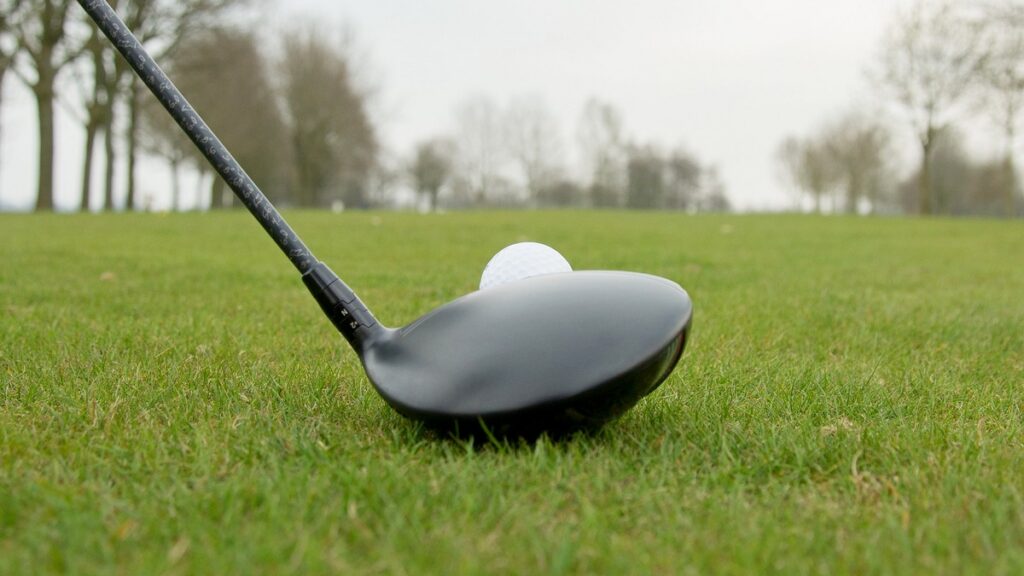The Secret of Golf
by David Blair
Down the years, certain players have influenced the way that we think about the golf swing.
For me, Nick Price is a classic case in point. I can remember Nick being interviewed a week or so before he won the 1992 USPGA Championship at Bellerive – the first of his three majors. He was talking about how he believed he had finally discovered (and understood) the natural ‘symmetry’ that exists in a solid swing – specifically in the way the through-swing mirrors the backswing.
This is the real key to developing what I like to term a ‘naturally correct’ swing, and over the following pages I am going to show you a couple of simple exercises that will help you enjoy the same symmetry in your swing.
The Secret of Golf
Establishing the all-important ‘Control Area’
The golf swing is a combination move: the body turns, the hands and arms react, the motion oiled and synchronized with the natural hingeing or ‘cocking’ of the wrists that first stores and then releases energy. In order for that chain of events to occur smoothly, it’s vital that you create what I refer to as the ‘control area’ of the upper arms and shoulders at the set-up. By extending your arms and gently turning your elbows inwards, you not only create this long, narrow triangle but you also enable the wrists to work freely in your swing (bunch up your arms and you will appreciate the restriction this puts on the wrists).
3 easy steps…
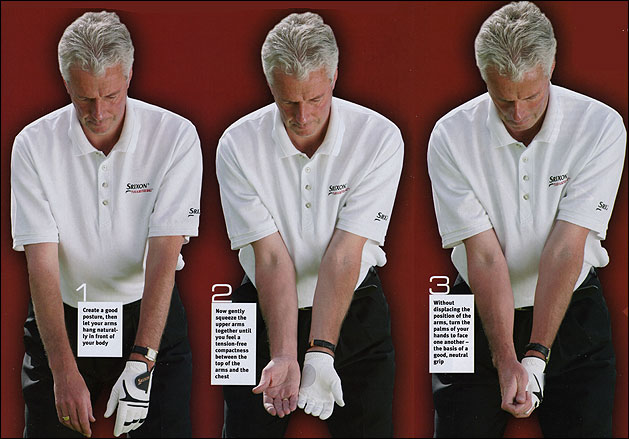
2 – Now gently squeeze the upper arms together until you feel a tension-free compactness betweent the top of the arms and the chest
3 – Without displacing the position of the arms, turn the palms of your hands to face one another – the basis of a good, neutral grip
The Secret of Golf
Stand in front of a mirror and rehearse this easy 3-step exercise that creates the all-important ‘control area’. Establishing and maintaining what I describe as this ‘long, narrow triangle’ is your first step on the way to making and repeating a naturally correct golf swing.
Those of you familiar with Ben Hogan’s book The Modern Fundamentals of Golf might recognize this idea. Hogan was perhaps the greatest exponent of creating this type of relationship between the arms and the elbows, going so far as to suggest that he imagined his forearms were bound together to remind him of the importance of pointing the elbows in towards the hips and maintaining this relationship through the swing.
The Secret of Golf
How to make the perfect backswing
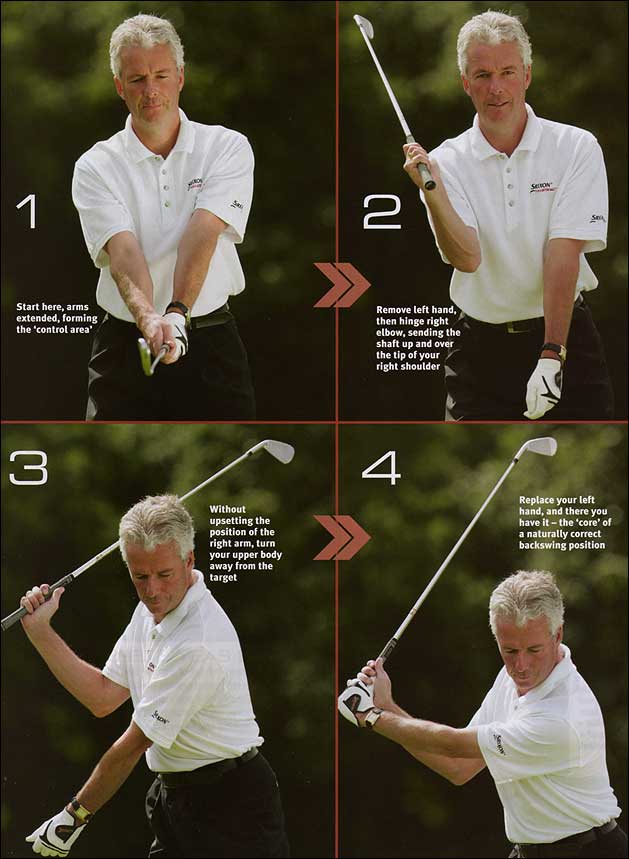
2 – Remove left hand, then hinge right elbow, sending the shaft up and over the tip of your right shoulder
3 – Without upsetting the position of the right arm, turn your upper body away from the target
4 – Replace your left hand, and there you have it – the ‘core’ of a naturally correct backswing position
The Secret of Golf
The right-arm drill
Many of the students I coach on my golf schools say they are confused at the way golf instruction over analyses the wrist action in the process of learning to make a backswing. Well, here’s one of the simple exercises that I use to illustrate just how easy it is to make a correct backswing without even thinking about the details – one that features a natural hingeing of the wrist and right elbow.
Using the long, narrow triangle as our starting point (1), you simply hold a club up at waist high, remove your left hand, and then hinge the right arm at the elbow to cock the club up and over the tip of your right shoulder (2). From here, turn your shoulders and upper body away from the target until the right forearm is to the right of your body (3), the right elbow again pointing at your right hip. Finally, reach across and replace your left hand on the grip. Get a feel for this position. You are now in a perfectly sound and naturally correct backswing position.
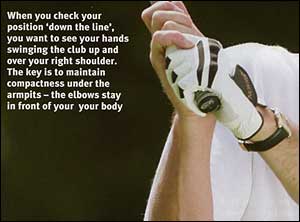
The Secret of Golf
NOTE: The key to the exercise is that through repetition your body begins to recognize and respond automatically to the sensations involved in putting together a naturally correct and symmetrical backswing. What you have here is the ‘core’ of the motion – completing the shoulder turn (the extent of which is down to the length of the club you are using) being the final dynamic that determines the actual length of your backswing. Use this drill when you practise, between hitting shots for real.
How to make the perfect through swing
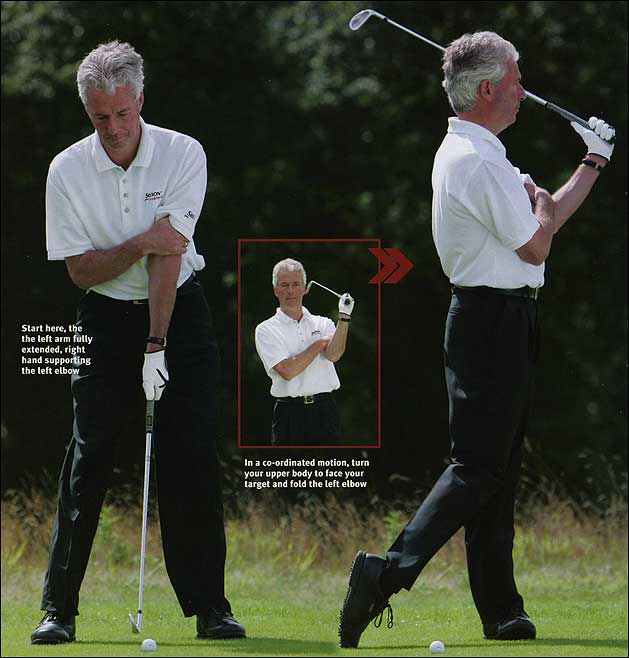
In a co-ordinated motion, turn your upper body to face your target and fold the left elbow
The Secret of Golf
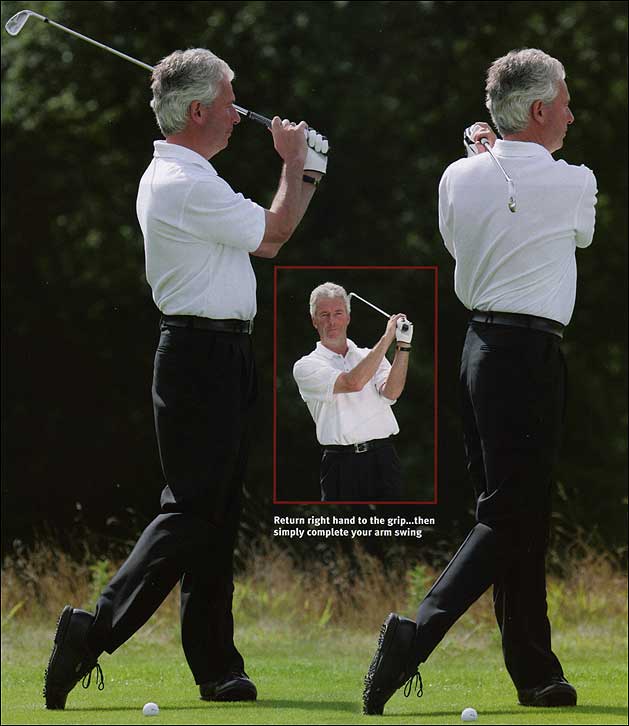
The Secret of Golf
Left-arm only drill teaches you vital symmetry in through-swing
Are you one of those amateurs who constantly checks positions in the backswing but neglects the follow-through? If so, you are not alone in failing to understand that the way in which you complete your swing is one of the keys to its overall power and efficiency. Where the right arm folds away to create the backswing, the left arm folds to establish the mirror-image symmetry of a naturally correct action through the ball – one that maximises clubhead speed through impact.
Starting this time with just the left hand on the grip, hold your left elbow with your right hand in front of the body to help maintain good ‘connection’. Now rehearse the exercise you see here to appreciate the sensation of a balanced, tension free and controlled through swing motion. Simply turn and stand up to face your target, allowing the left elbow to fold whilst staying in front of the body. The clubshaft swings up and over the tip of your left shoulder. Holding the upper part of the left arm with the right hand keeps the left arm connected with the elbow still pointing at the left hip as you turn to the finish, which is vital. When you place your right hand on the grip and then complete your turn through towards the target (far right), you will find that you have replicated the shape of a naturally correct follow-through: totally in balance and with a straight up-and-down look that minimises stress on your back.
I cannot stress too strongly how effective this left-arm only drill is in terms of improving the quality of your release through the ball. One of the biggest faults in the through-swing is ‘chasing’ after the ball with the left arm, as opposed to folding the left elbow and truly releasing the clubhead down the line. The result is that the left arm is seen to work (or ‘chicken-wing’) away from body, rather than rotating and folding in the direction of the target in harmony with the rotation of the body. For a naturally correct release, the left elbow must ‘soften’ and give way as the right hand and arm swing across the chest to arrive at this balanced finish – a mirror-image of the backswing.
